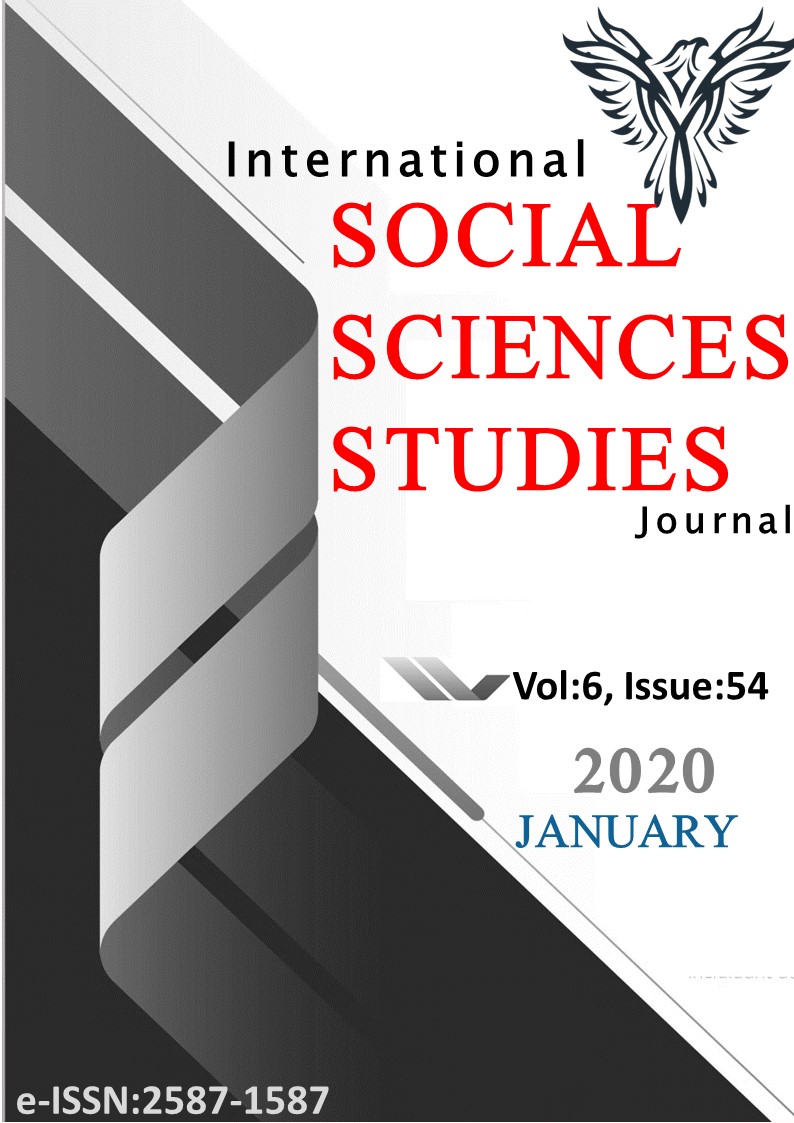Sosyal-Duygusal Öğrenme Programı ile Desteklenen Eğitsel Oyunların Üniversite Öğrencilerinin Sosyal-Duygusal Öğrenme Becerilerine Etkisi
Author :
Abstract
Eğitsel oyunlar, oyun oynarken eğitmeyi amaçlayan bir araçtır. Çalışmanın amacı, sosyal-duygusal öğrenme (SEL) programı ile desteklenen eğitsel oyunlar ile verilen çeşitli oyunların sosyal-duygusal becerilere etkisini araştırmaktır. Araştırmada deneysel ön-test son-test kontrol gruplu desen kullanılmıştır. Araştırmanın deney grubunu, 2017-2018 eğitim-öğretim yılı bahar döneminde, Gazi Üniversitesi Spor Bilimleri Fakültesi Beden Eğitimi ve Spor Öğretmenliği Bölümü 3.sınıfında öğrenim gören 38 öğrenci; kontrol grubunu ise Rekreasyon Bölümü 2. sınıfında öğrenim gören 37 öğrenci oluşturmuştur. Amaçlı örnekleme yöntemine göre seçilen her iki grup da daha önce eğitsel oyunlar dersi almamıştır. Araştırmada deney grubundaki öğrencilere toplam 12 oturum SEL tabanlı eğitsel oyunlar dersi verilmiştir. Kontrol grubu öğrencileri ise mevcut öğretim programına devam etmiştir. Ders planları sosyal-duygusal öğrenme modelinin basamaklarına ve ilgili literatüre göre düzenlenmiştir. Veri toplama aracı olarak Deleware Sosyal-Duygusal Yeterlik Ölçeği (DSEC-S) ve yansıtıcı günlük değerlendirme formu kullanılmıştır. Verilerin analizinde ölçeklerden elde edilen tanımlayıcı istatistik ve Tek Yönlü Kovaryans Analizi (ANCOVA), yansıtıcı günlük değerlendirme formundan elde edilen yüzdelik analizi yöntemlerinden faydalanılmıştır. Tanımlayıcı istatistik sonucunda, deney ve kontrol gruplarının DSEC-S toplam puanları arasında anlamlı farklar olduğu, deney grubu öğrencilerinin son-test toplam puanlarında anlamlı bir artış olduğu, kontrol grubu öğrencilerinin toplam puanlarının ise çok az seviyede yükseldiği tespit edilmiştir. ANCOVA sonucuna göre, DSEC-S son-test toplam puanlarında deney grubu lehine anlamlı bir fark olduğu tespit edilmiştir. Yansıtıcı günlük değerlendirme formu sonuçlarına göre öğrencilerin öz farkındalık, öz yönetim, sorumlu karar alma, ilişki becerileri ve sosyal farkındalık davranışlarında yükselme olduğu belirlenmiştir. Sonuç olarak, 12 haftalık SEL tabanlı eğitsel oyunların üniversite öğrencilerinin sosyal-duygusal becerilerinin gelişmesinde etkili olduğu belirlenmiştir. Ayrıca, SEL tabanlı eğitsel oyunlardan elde edilen sonuçlar kültürel adaptasyonun sağlandığını göstermektedir.
Keywords
Abstract
Educational games are a tool aimed at educating when playing games. The aim of the study is to investigate the impact of various games on social-emotional skills given through educational games supported by the social-emotional learning (SEL) program. In this study, pattern with experimental pre-test final-test control group was used. The experiment group of the study was composed of 38 students studying in 3rd grade in the Department of Physical Education and Sports Teaching in the Faculty of Sport Sciences of Gazi University; the control group was composed of 37 students studying in 2nd grade in the Recreation Department in spring semester of the 2017-2018 academic year. Both groups selected according to the intended sampling method have not taken educational games lessons before. In the study, a total of 12 sessions of SEL-based educational games lesson was given to the students in the experiment group. Control group Students continued their current education program. The course plans were organized according to the steps of the social-emotional learning model and the relevant literature. The Deleware Social-Emotional Competence Scale (DSEC-S) and reflective daily evaluation form were used as data collection tools. Descriptive statistics obtained from scales and One-Way Covariance Analysis (ANCOVA), percentile analysis methods obtained from reflective daily evaluation form were used in the analysis of the data. As a result of descriptive statistics, it was determined that there were significant differences between the DSEC-S total scores of the experimental and control groups, that there was a significant increase in the final-test total scores of the experimental group students, and that the total scores of the control group students rose slightly. According to the ANCOVA result, it was found that there was a significant difference in DSEC-S final-test total scores in favor of the experimental group. According to the results of the reflective daily assessment form, it was determined that there was an increase in the students behaviors of self-awareness, self-management, responsible decision-making, relationship skills and social awareness. As a result, it was determined that 12 weeks of SEL-based educational games were effective in developing the social-emotional skills of university students. Furthermore, results from SEL-based educational games indicate that cultural adaptation has been achieved.
Keywords
- Arıkan, N. (2020). “Sosyal-Duygusal Öğrenme Programı İle Desteklenen Eğitsel Oyunların Üniversite Öğrencilerinin Sosyal-
- 203. SOSYAL-DUYGUSAL ÖĞRENME PROGRAMI İLE DESTEKLENEN EĞİTSEL OYUNLARIN ÜNİVERSİTE ÖĞRENCİLERİNİN SOSYALDUYGUSAL ÖĞRENME BECERİLERİNE ETKİSİ The Effect of Educational Games Supported by the Social-Emotional Learning Program on the Social-Emotional Learning Skills of University Students Arş.Gör.Dr. Neslihan ARIKAN Gazi Üniversitesi, Spor Bilimleri Fakültesi, Beden Eğitimi ve Spor Öğretmenliği Bölümü, Ankara/TÜRKİYE ÖZET Eğitsel oyunlar, oyun oynarken eğitmeyi amaçlayan bir araçtır. Çalışmanın amacı, sosyal-duygusal öğrenme (SEL) programı ile desteklenen eğitsel oyunlar ile verilen çeşitli oyunların sosyal-duygusal becerilere etkisini araştırmaktır. Araştırmada deneysel ön-test son-test kontrol gruplu desen kullanılmıştır. Araştırmanın deney grubunu, 2017-2018 eğitim-öğretim yılı bahar döneminde, Gazi Üniversitesi Spor Bilimleri Fakültesi Beden Eğitimi ve Spor Öğretmenliği Bölümü 3.sınıfında öğrenim gören 38 öğrenci; kontrol grubunu ise Rekreasyon Bölümü 2. sınıfında öğrenim gören 37 öğrenci oluşturmuştur. Amaçlı örnekleme yöntemine göre seçilen her iki grup da daha önce eğitsel oyunlar dersi almamıştır. Araştırmada deney grubundaki öğrencilere toplam 12 oturum SEL tabanlı eğitsel oyunlar dersi verilmiştir. Kontrol grubu öğrencileri ise mevcut öğretim programına devam etmiştir. Ders planları sosyal-duygusal öğrenme modelinin basamaklarına ve ilgili literatüre göre düzenlenmiştir. Veri toplama aracı olarak Deleware SosyalDuygusal Yeterlik Ölçeği (DSEC-S) ve yansıtıcı günlük değerlendirme formu kullanılmıştır. Verilerin analizinde ölçeklerden elde edilen tanımlayıcı istatistik ve Tek Yönlü Kovaryans Analizi (ANCOVA), yansıtıcı günlük değerlendirme formundan elde edilen yüzdelik analizi yöntemlerinden faydalanılmıştır. Tanımlayıcı istatistik sonucunda, deney ve kontrol gruplarının DSEC-S toplam puanları arasında anlamlı farklar olduğu, deney grubu öğrencilerinin son-test toplam puanlarında anlamlı bir artış olduğu, kontrol grubu öğrencilerinin toplam puanlarının ise çok az seviyede yükseldiği tespit edilmiştir. ANCOVA sonucuna göre, DSEC-S son-test toplam puanlarında deney grubu lehine anlamlı bir fark olduğu tespit edilmiştir. Yansıtıcı günlük değerlendirme formu sonuçlarına göre öğrencilerin öz farkındalık, öz yönetim, sorumlu karar alma, ilişki becerileri ve sosyal farkındalık davranışlarında yükselme olduğu belirlenmiştir. Sonuç olarak, 12 haftalık SEL tabanlı eğitsel oyunların üniversite öğrencilerinin sosyal-duygusal becerilerinin gelişmesinde etkili olduğu belirlenmiştir. Ayrıca, SEL tabanlı eğitsel oyunlardan elde edilen sonuçlar kültürel adaptasyonun sağlandığını





